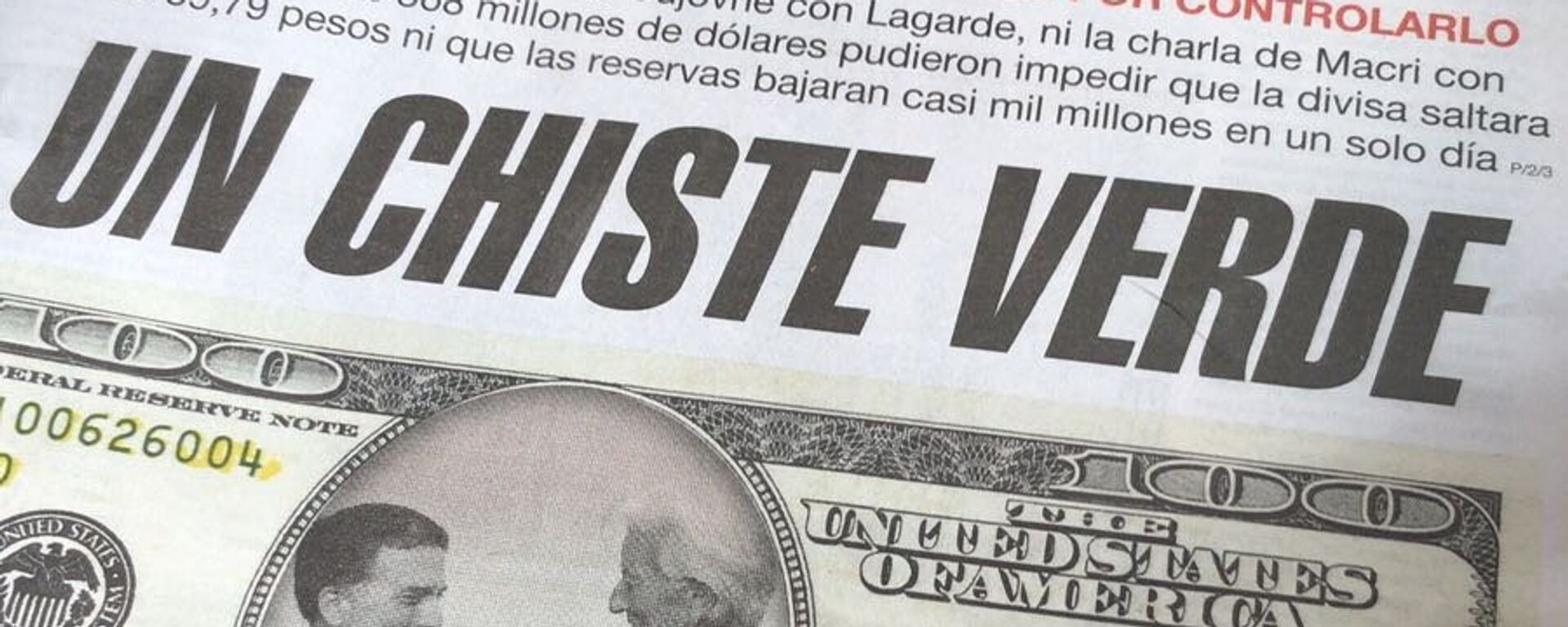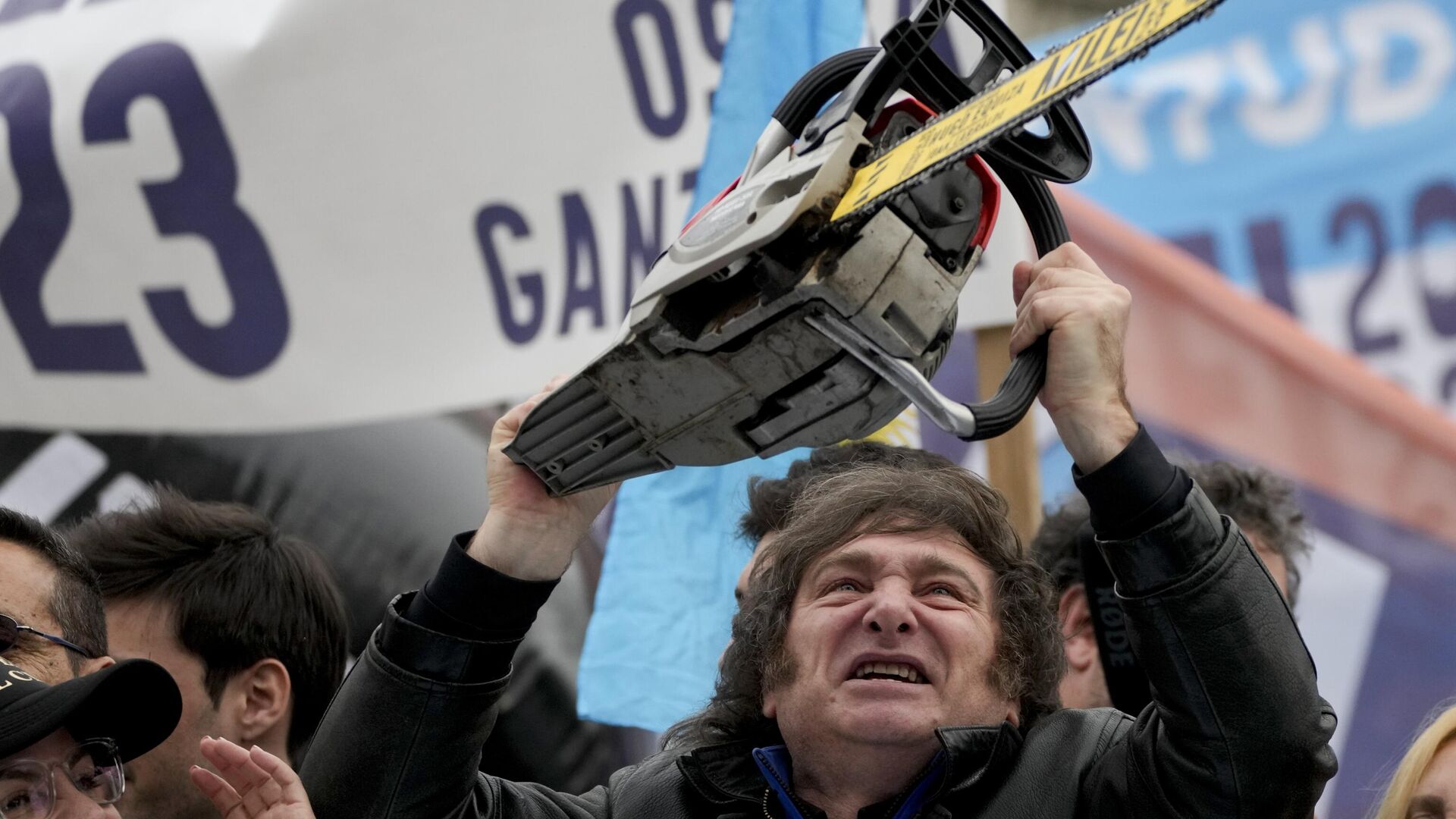https://sputnikglobe.com/20231214/dollar-dependence-would-force-argentina-to-tango-to-washingtons-tune-1115586633.html
Dollar Dependence Would Force Argentina to Tango to Washington’s Tune
Dollar Dependence Would Force Argentina to Tango to Washington’s Tune
Sputnik International
Russian President Vladimir Putin informed his Argentinian counterpart of the potential risks associated with linking the Latin American nation’s currency to the US dollar, warning that it could result in a “huge loss of sovereignty.” Sputnik reached out to veteran financial analyst Paul Goncharoff for more details on the risks involved.
2023-12-14T14:28+0000
2023-12-14T14:28+0000
2023-12-14T16:12+0000
economy
vladimir putin
javier milei
mauricio macri
us
argentina
russia
washington
brics
international monetary fund
https://cdn1.img.sputnikglobe.com/img/07e7/0c/0e/1115586288_0:200:3072:1928_1920x0_80_0_0_c7789193f15482af741585745beca515.jpg
Russia’s president has offered a friendly word of advice to Argentinian President Javier Milei at his year-end press conference on Thursday, saying the idea of pegging the Argentinian peso to the American dollar carries with it major political and economic risks.Argentina Would Be Forced to Tango to Washington’s Tune“I agree with President Putin that connecting the Argentine Peso to the US Dollar will have a deep and long term effect on the independent sovereignty of Argentina without a doubt,” Paul Goncharoff, owner of consulting firm Goncharoff LLC, told Sputnik.Pointing to a growing global trend toward de-dollarization over the past 3-4 years, including by Russia and other BRICS nations, the financial analyst pointed out that “one of the main desires voiced by all is to be able to freely conduct trade and movement of capital in their own national currencies.”Argentina has been in the grips of a major economic and fiscal crisis for more than half a decade, facing soaring inflation and a surging consumer price index thanks to a years-long drought damaging its agricultural exports, and difficulties associated with the repayment of a massive $57 billion loan by the International Monetary Fund taken out by neoliberal President Mauricio Macri in 2018.The fiscal crisis associated with the loan plagued Macri’s Peronist successor, Alberto Fernandez, throughout his four-year term in office, ultimately leading him to announce earlier this year that he wouldn’t be seeking another term. President Javier Milei was elected as his successor in presidential elections in November.The self-described “anarcho-capitalist” has promised to slash spending, take a chainsaw to a host of government ministries, and institute a series of fiscal measures to try to stabilize the inflation situation, including devaluing the peso against the dollar. The new president has also vowed to have a second look at Buenos Aires’ political and trade relationships vis-à-vis Washington and Beijing, and announced on November 30 that his government would not be moving forward with his predecessors’ plans to integrate Argentina into the BRICS bloc of countries.
https://sputnikglobe.com/20231213/argentina-to-halve-exchange-rate-of-national-currency-to-fight-crisis---economy-minister-1115547512.html
argentina
russia
washington
Sputnik International
feedback@sputniknews.com
+74956456601
MIA „Rossiya Segodnya“
2023
News
en_EN
Sputnik International
feedback@sputniknews.com
+74956456601
MIA „Rossiya Segodnya“
Sputnik International
feedback@sputniknews.com
+74956456601
MIA „Rossiya Segodnya“
dollar, united states, argentina, milei, putin, currency, crisis, economic, political, dependence, reliance
dollar, united states, argentina, milei, putin, currency, crisis, economic, political, dependence, reliance
Dollar Dependence Would Force Argentina to Tango to Washington’s Tune
14:28 GMT 14.12.2023 (Updated: 16:12 GMT 14.12.2023) Russian President Vladimir Putin informed his Argentinian counterpart of the potential risks associated with linking the Latin American nation’s currency to the US dollar, warning that it could result in a “huge loss of sovereignty.” Sputnik reached out to veteran financial analyst Paul Goncharoff for more details on the risks involved.
Russia’s president has offered a friendly word of advice to Argentinian President Javier Milei at his year-end press conference on Thursday, saying the idea of pegging the Argentinian peso to the American dollar carries with it major political and economic risks.
“Ultimately, if Argentina’s current leadership deems this to be the sole viable solution to address these financial and economic challenges, it remains their prerogative. But is nevertheless a huge loss of sovereignty,” Putin emphasized.
Argentina Would Be Forced to Tango to Washington’s Tune
“I agree with President Putin that connecting the Argentine Peso to the US Dollar will have a deep and long term effect on the independent sovereignty of Argentina without a doubt,” Paul Goncharoff, owner of consulting firm Goncharoff LLC, told Sputnik.
“Consider that regardless of the political and economic will of Argentina itself, its ability to fine tune its economic direction will be severely limited and wholly dependent on the vagaries of US economic policies. In addition, it also places the Argentine nation in a position where, God forbid, sanctions are imposed against it for ‘political behavior modification’, they will be well and truly trapped by powers from without,” Goncharoff explained.
Pointing to a growing global trend toward de-dollarization over the past 3-4 years, including by Russia and other BRICS nations, the financial analyst pointed out that “one of the main desires voiced by all is to be able to freely conduct trade and movement of capital in their own national currencies.”
“This is an empowering step for any country, and one that is in keeping with their national interests, independence, and ability to serve the needs of their sovereign peoples. It is often repeated that diplomacy by sanctions is akin to shooting oneself in the foot. It is, especially where ‘reserve currencies’ like the US dollar and euro are concerned. They were once viewed and used avidly and positively, however after having shown their propensity to be politically weaponized through sanctions, blocking accounts, allowing or disallowing free trade, seizing assets and freezing or even dispensing of others funds on account, the picture has changed tragically, and I must add irrevocably. Linking to a foreign currency simply limits the ability to act on one's own discretion as the funds used are quite simply not your own,” Goncharoff emphasized.
Argentina has been in the grips of a major economic and fiscal crisis for more than half a decade, facing soaring inflation and a surging consumer price index thanks to a years-long drought damaging its agricultural exports, and difficulties associated with the repayment of a massive $57 billion loan by the International Monetary Fund taken out by neoliberal President Mauricio Macri in 2018.

13 December 2023, 02:36 GMT
The fiscal crisis associated with the loan plagued Macri’s Peronist successor, Alberto Fernandez, throughout his four-year term in office, ultimately leading him to announce earlier this year that he wouldn’t be seeking another term. President Javier Milei was elected as his successor in presidential elections in November.
The self-described “anarcho-capitalist” has promised to slash spending, take a chainsaw to a host of government ministries, and institute a series of fiscal measures to try to stabilize the inflation situation, including devaluing the peso against the dollar. The new president has also vowed to have a second look at Buenos Aires’ political and trade relationships vis-à-vis Washington and Beijing, and announced on November 30 that his government would not be moving forward with his predecessors’ plans to integrate Argentina into the BRICS bloc of countries.



